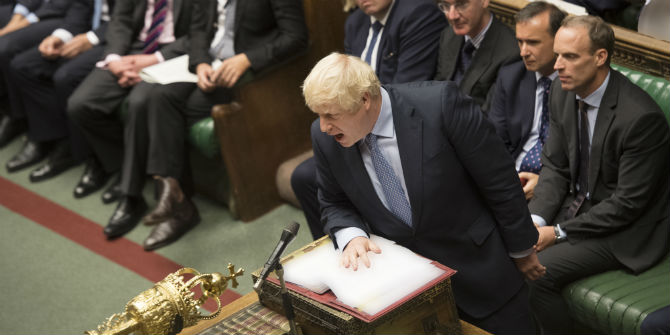 The Supreme Court’s 8:3 ruling against the government is measured and restrained in tone – but it is the most important constitutional case the Court has ever heard, writes Jo Murkens. The Justices have ruled that the government cannot leave the EU without Parliament’s consent. And while they also declared EU membership a reserved matter and therefore one that must be decided at Westminster rather than by the Northern Ireland Assembly, this is unlikely to be the end of the story.
The Supreme Court’s 8:3 ruling against the government is measured and restrained in tone – but it is the most important constitutional case the Court has ever heard, writes Jo Murkens. The Justices have ruled that the government cannot leave the EU without Parliament’s consent. And while they also declared EU membership a reserved matter and therefore one that must be decided at Westminster rather than by the Northern Ireland Assembly, this is unlikely to be the end of the story.
The UK Supreme Court had two main questions to decide in Miller v Secretary of State for Exiting the European Union. The first question is familiar from the ruling in the Divisional Court in October: can the Secretary of State serve notice of the intention to withdraw from the EU under Art 50 TEU without prior authorisation by an Act of Parliament? The second question adds a devolution dimension from a separate challenge in Northern Ireland: do the terms of the Northern Ireland Act 1998 require the agreement of the devolved legislature?

With a majority of 8:3 the Supreme Court Justices dismissed the government’s claim that parliamentary approval was not required. Lord Neuberger’s decision, with which seven other judges agreed, is an exercise in good housekeeping. It contains few constitutionally controversial or politically combustible statements. The Justices acknowledge that the European Communities Act 1972 authorised a ‘dynamic process’ by which EU law becomes an autonomous and overriding source of UK law. UK law has, as a result, changed as a result of EU membership, sometimes even without further parliamentary approval – a process which the ECA 1972 clearly envisages. Does that mean that Parliament also envisaged that ministers could bring about the UK’s withdrawal from the EU without parliamentary approval? This is an issue that Lord Neuberger seeks to dispel:
‘There is a vital difference between changes in domestic law resulting from variations in the content of EU law arising from new EU legislation, and changes in domestic law resulting from withdrawal by the United Kingdom from the European Union.’ [78]
What the government wishes to do is to exercise political power unilaterally which would fundamentally change the constitutional arrangements of the UK. Such a change is different in kind from any variations to be expected in relation to the content of EU law. Leaving the EU will be as significant a constitutional change as joining the EEC in 1973.
The loss of an independent source of law is a fundamental legal change that is compounded by changes in domestic rights, with which the Divisional Court was concerned last October. As a result, the prerogative power cannot be used by ministers to trigger Art.50 TEU, and the prior authority of an Act of Parliament is required. If you are looking for the clearest statement in the judgement, it is arguably this statement in paragraph 82:
‘We cannot accept that a major change to UK constitutional arrangements can be achieved by a ministers alone; it must be effected in the only way that the UK constitution recognises, namely by Parliamentary legislation.’
In the final sections the UKSC clarifies the legal significance of the June referendum and of Northern Ireland. It confirms that the referendum was not legally binding and cites official government acceptance of that position. This is not to say that the referendum has no effect whatsoever. Its effect is political, and ‘it has already shown itself to be of great political significance’ [124].
The UKSC’s verdict on devolution will disappoint some, and it does not form a significant part of the decision. The weight of the main question, whether the Northern Ireland Act 1998 requires that primary legislation be passed before Art.50 is invoked, is greatly reduced by the overall decision of the UKSC which stresses the need for primary legislation from Westminster. The UKSC is unanimous in rejecting a formal role for the Northern Ireland Assembly ahead of Art 50, and its reasoning is certainly coherent. The devolution legislation assumes that the UK would be a member of the EU, but does not require it to be a member. Since EU membership is clearly a reserved matter, the decision whether or not to give notice under Art 50 falls squarely to the Westminster Parliament.
But the question surrounding Art 50 in the present appeal is clearly not the end of the constitutional story. Paragraph 132 is perhaps the most cryptic paragraph of the decision. The UKSC reiterates its overall conclusion about the importance of legislation in the context of devolution:
‘It would accordingly be incongruous if constraints imposed on the legislative competence of the devolved administrations by specific statutory provisions were to be removed, thereby enlarging that competence, other than by statute.’
Since Westminster must now give prior legislative authorisation, the UKSC does not think it is ‘necessary to reach a definitive view’ on the EU constraints and provisions empowering the implementation of EU law in the Northern Ireland Act. The Northern Ireland Assembly does not have a veto. But that is not to say that its consent will not be needed when it comes to changing the NI Act 1998 to give legal effect to EU withdrawal. This is a space that needs to be watched.
Miller is the most important constitutional case the UKSC has ever heard – and it boils down to this: the government requires the authority of primary legislation before it can change the laws of the UK constitution. It is a reminder of the function of a constitution and of the rule of law. It is a testament to the independence of the judiciary at a time when it has come under pressure from the media and some politicians. It is a re-statement of the obvious when all the other questions surrounding withdrawal from the EU are uncertain. The legal and procedural issues have now been resolved. Our MPs will now have to face the much more controversial and combustible political and substantive issues in Parliament.
This post represents the views of the author and not those of the Brexit blog, nor the LSE.
Jo Murkens is Associate Professor in the Department of Law at the LSE.
More by Jo Murkens:
The High Court judgment on Article 50 is a proper drubbing for the government
The Great ‘Repeal’ Act will leave Parliament sidelined and disempowered







1 Comments